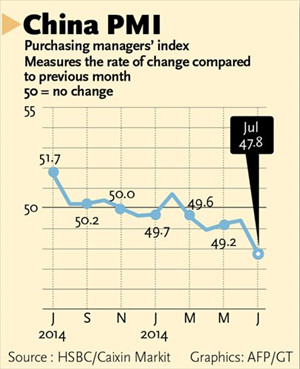
Analysts caution against over-interpreting July data
China's factory activity shrank more than initially estimated in July, contracting by the most in two years as new orders fell, a private survey showed on Monday.
While analysts cautioned about over-interpretation of the July figures that were often affected by seasonal factors, argument remains about whether the government should adopt more proactive financial policies to stimulate the economy.
The final Caixin/Markit China Manufacturing Purchasing Managers' Index (PMI) dropped to 47.8 in July, the lowest reading since July 2013, from June's 49.4.
That was worse than a preliminary reading of 48.2 and marked the fifth straight month of contraction, as indicated by a reading below 50.
New orders reversed into contraction last month after growing in June, while factory output shrank for the third consecutive month to slide to 47.1, a level not seen in more than three and a half years.
The survey showed employment fell for the 21st straight month, factories were also forced to cut final prices to a six-month low due to increased competition for new business.
China's official factory activity survey released on Saturday showed growth at big manufacturing companies unexpectedly stalled in July as demand at home and abroad weakened.
The official PMI stood at 50 in July, compared to the previous month's 50.2. The official survey focuses on larger companies.
The weaker-than-expected private and official readings will stoke expectations of more economic support measures, which have intensified in recent weeks as Beijing struggles to avert a full-blown stock market crash that could do further damage to the already cooling economy.
Downturn pressure remains
Yet some economists warned against reading too much into the July data, arguing that the factory weakness may be temporary.
Liu Xuezhi, an analyst with Bank of Communications, said the PMI fall in July has its seasonal reasons, as the July index fell at least eight times in the past 10 years.
The National Bureau of Statistics also said on Saturday that the summer heat and rainstorms in eastern and southern China have led to output reduction in many factories.
The shaky stock markets in the past two months have contributed to the falling confidence of manufacturers and the economy's unpredictability, which has dragged down the PMI, Liu told the Global Times on Monday.
Liu added that the falling prices of energy goods and raw materials have been passed on to downstream manufacturers, causing industrial contraction.
Zhu Haibin, chief China economist at J.P. Morgan, said the slowdown in manufacturing may not be a bad thing, as the service industry has been on the rise in the first half of the year. "It reflects the rebalance of economy," the Securities Times reported on Monday.
While soft global demand could continue to weigh on China's exports, market watchers like Julian Evans-Pritchard at Capital Economics believe increased government infrastructure spending and further policy easing should support domestic consumption in the coming months, ensuring that the economy meets the government's 7 percent growth target for the year.
Others are less optimistic about the economic prospects.
Xu Gao, chief economist at China Everbright Securities, said in a report he sent to the Global times on Monday that downturn pressure remains. though the looser monetary policies and recent stimulus policies to the real estate sector have led to a recovery in property sales.
Stabilizing the economy will be the central government's top priority in the second half of the year since a continuous economic slide will increase risks of bankruptcy, a financial crisis as well as rising unemployment, Xu said.
The government will continue to vigorously promote proactive fiscal policies and moderately relaxed monetary policies in the second half, Xu said.
The People's Bank of China has already cut interest rates four times since November and repeatedly loosened restrictions on bank lending.
After months of weakness, industrial output, retail sales and investments all grew slightly more than expected in June, raising hopes that earlier policy easing was finally starting to pay off. July data will be released over the next two weeks.
In an acknowledgement of difficulties ahead, the Political Bureau of the Communist Party of China promised last week to step up policy adjustments to keep growth stable.
However, the People's Daily ran a commentary on Monday, saying the country will keep strategically calm and will not use aggressive stimulus, focusing on the quality of the economy instead of focusing entirely on the ups and downs of GDP.


















































